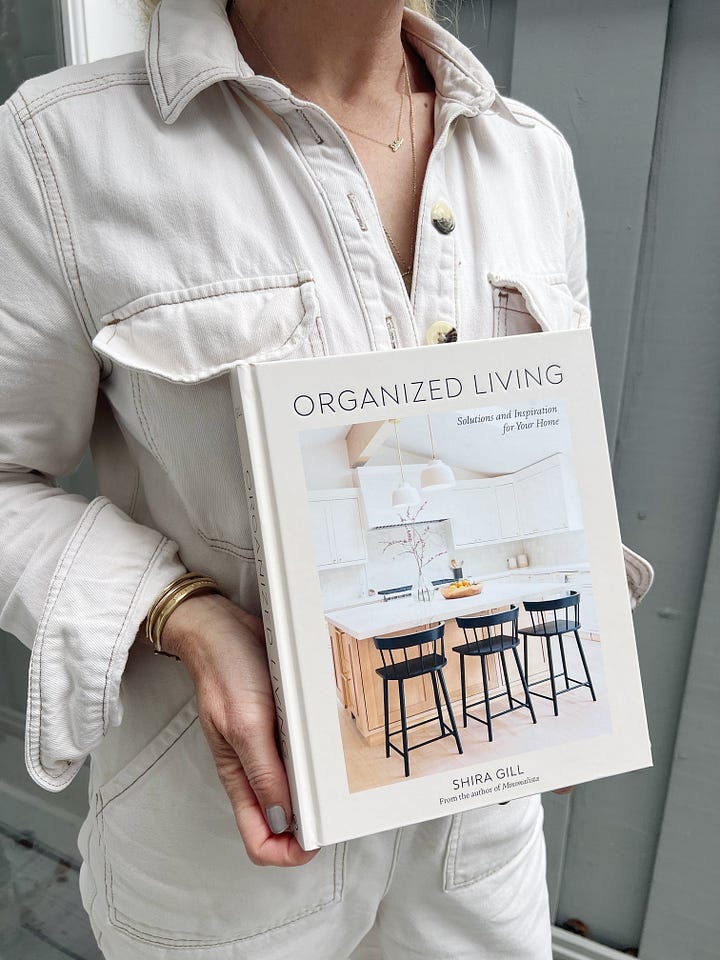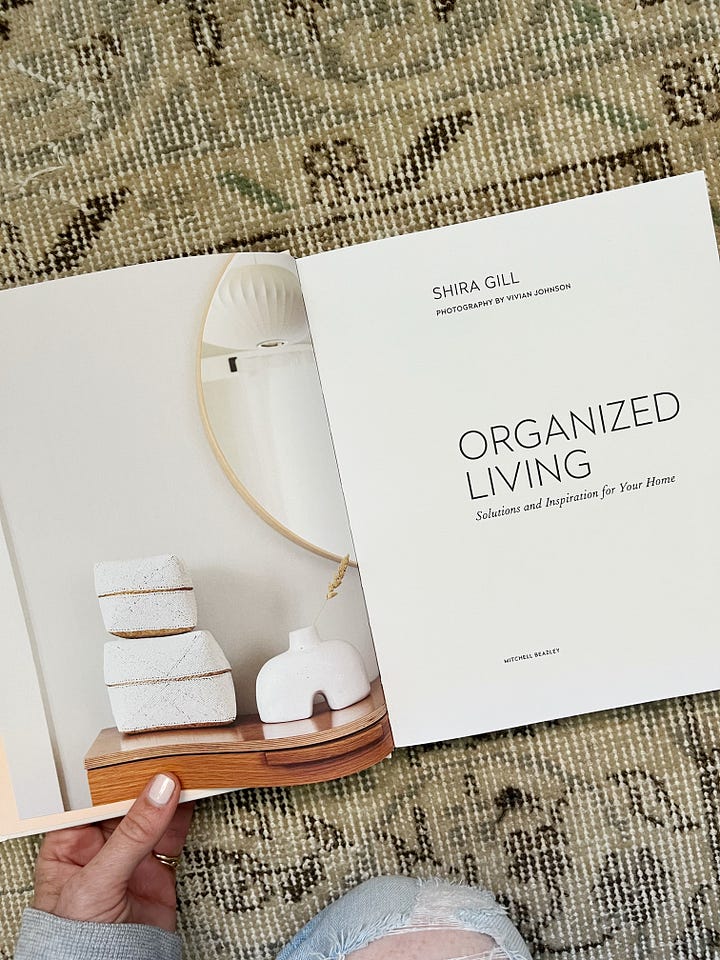Want to Write a Book - Here's How
Your step-by-step guide to getting published
The Life Edit is paywall free and available to all. Here’s why. You can support this newsletter (and make my day) by liking this post, and sharing it with anyone who you think would enjoy it. x
Let’s Start Here
I stumbled into the publishing industry in 2020 knowing literally nothing about how anything worked. I dove in, asked a lot of questions, found myself some wonderful mentors, and worked incredibly hard.
Now, three years later, I have a bestselling book (Minimalista), a second book coming out this fall (Organized Living), and (because I’m a little nuts) a third book set to be published next year.
I opted to go with a large traditional publisher(Penguin Random House) because my goal as an author has always been to scale my impact and help more people. Plus being a solo entrepreneur can be quite isolating, so I loved the idea of working with (and learning from) a publishing team.
My experience has been incredibly positive across the board, so I thought I’d break down my biggest tips and takeaways from the industry.
If you’ve ever been curious about the writing or publishing process, I’m sharing everything I’ve learned in simple bullets, below.
Note: If you’re interested in self-publishing, the Alliance of Independent Authors provides advice and advocacy for self-publishing authors and lots of great resources. Linked here.


Step One: Solidify Your Idea, Message and Positioning
My literary agent told me once that agents and editors need the following questions answered to even consider taking a chance on your book:
What is your original idea?
Who is it for?
Why is it important right now?
Why are you the right person to write this book?
Before you even think about looking for an agent or pitching your concept, you must clarify and crystalize your answer to these questions. The more specific you can be the better.
Try It:
Take the time to get clear on what makes your concept unique, timely, targeted, and useful.
Clarify your positioning - are you going for expert status or best friend energy? What tone will your book be written in and for who?
Familiarize yourself with books in your field or category so you can speak to why your book is different / better.
Make sure you have a list of comps (similar books) that have performed well - i.e. made money. Ultimately publishing is a business and agents and editors need to ensure the gamble they take on your book will have a decent chance of paying off.
Step Two: Prep Your Proposal
Once you’ve nailed your content, target audience, and positioning, you’ll want to write a concise and compelling book proposal. For non-fiction submissions this typically consists of a table of contents, introduction, and sample chapter. A strong proposal is your ticket to landing a great agent and publisher so do your due diligence: edit like crazy, have people you trust proofread it, and hire a developmental editor to weigh in if you want a professional set of eyes. Add images or design elements for extra credit.
Fiction is a different beast which I know very little about, but my understanding is that you need to include your entire manuscript when submitting.
Try It: Consider how you can organize the content you want to share into broad categories, and present it in the most reader-friendly format possible. It helps to ask yourself: what do I want my reader to gain, learn, or understand by the end of this book? The more efficient you can be the better. Don’t stop until you feel confident you’ve nailed it. Nailing the structure will make the writing of your book so much easier.
Step Three: Get Yourself an Agent
Assuming you want to go the traditional publishing route (as opposed to self publishing) you’ll need to start by teaming up with a very good agent. It’s your agent (not you) who will shop around your proposal to editors / publishers and sell your book. I suggest leveraging every imaginable direct connection you have because agents get an insane amount of submissions, but if you don’t have any - not to worry. Most agencies state clearly if they’re taking submissions on their websites.
Resource: The Literary Agents list includes agents and literary agencies that represent poets, fiction writers, and creative nonfiction writers, plus details about the kind of books they're interested in representing, their clients, and the best way to contact them. Linked here.


Step Four: Break It Down
Once you’ve clarified your message and structure, you’ll have to write the actual book. Spoiler alert: this undertaking will likely feel a wee bit daunting. Here’s where simple math becomes your new best friend. Look at the structure you’ve devised for your manuscript and divide the time you have given yourself to write the book by the number of pages or chapters you plan to write. Say your book has 24 chapters. You could do what I did and write one short chapter a week, and you’ll complete your first manuscript draft in six months.
Believe me – If I had focused on having to complete a 300-page book, I might never have started. Instead, I challenged myself to knock out a single chapter each week until I was done. My mantra was small, consistent action will lead to massive results. My other mantra was progress over perfection. The weekly chapters I completed were sloppy first drafts, and needed quite a bit of editing and polish, but they enabled me to build momentum and make progress.
Try It: Map out a concrete timeline for writing your book. You could commit to a page a day, a chapter a week, or whatever sounds realistic to you. I typically give myself a week to write a hot mess chapter, and another week for editing and refining it- basically two weeks per semi-polished chapter. You can give yourself as much time as you need, just make sure to break it down into small chunks and schedule each mini deadline so you can make good progress.


Step Five: Create a Consistent Writing Routine
When I got my first book deal I imagined being wildly prolific working in stylish cafes, typing away while nibbling on croissants. Unfortunately, my deadline overlapped with the pandemic lockdown so I traded sexy cafe life for hiding in my bedroom begging my kids not to talk to me.
To create a successful writing routine, I suggest choosing a consistent time and setting. I am sharpest first thing in the morning, so I often sleep with my laptop at the foot of our bed, that way I can wake up and immediately write for two straight uninterrupted hours. Nobody will talk to me if I write curled up in bed from 5am - 7am so that’s what helps optimize my productivity, but I’ve also written on planes, trains and automobiles, and sometimes I do my best work at the dining room table, fueled by Trader Joe’s ice cream sandwiches.
The real key to creating a consistent writing routine is to give yourself permission to do sub-par work. Do not let your dreams die in the name of perfectionism.
Try It: Identify when your sharpest focus time and schedule consistent blocks of times to write. Note: the most important thing is to show up and write when you say you are going to, even if you produce utter garbage. If you want to be a writer, you just have to write. Crappy first drafts mean you’re getting closer to your goal. Just keep going.
Step Six: Curate Your Support Team
I have always had the ability to both know my strengths and recognize my limitations. When it comes to writing, I am great at coming up with broad creative concepts and content, but I get lost when it comes to important details like proper comma usage (eek!), and I can repeat phrases and words a surprising amount of times. Fortunately, I have some talented and generous people in my life who have been willing to help me fine-tune my manuscripts when I hit roadblocks.
After 23 years together, my husband, Jordan, knows me better than anyone and has the ability to help me clarify exactly what I’m trying to say when I am fumbling over words. He also happens to have an MFA in creative writing and is one of the best writers I know. When I’m working on a manuscript, I basically beg him to review my draft so he can make sure my overall tone is on point and I don’t have any mortifying typos.
I’ve also hired some of my brilliant friends to give each manuscript a thoughtful edit for content clarity, technical errors, and word repetition. I think at one point my friend Leila told me I had used derivatives of the word “simple” over 100 times. Whoops. If you don’t have literary people in your immediate circle you can look for a mentor, rehire that developmental editor who helped you with your proposal, or just rely on your literary agent and editorial team to provide feedback as you go.
Try It: make sure to curate the support team you need to produce a final product you can feel proud of.
Step Seven: Sorry, You Have to Actually Promote Your Book
Marketing is a completely separate skill from writing, but trust that nobody will be able to market and promote your book as well as you will. Most publishers will provide you with some marketing and PR support, but I highly encourage you to take the lead in marketing and promoting your book. The key period for promotion will be the three months leading up to your publication date, and the three months after. Make sure you can dedicate some time to this so your book can be as successful as possible. A handful of actionable strategies and suggestions below:
Include a link to pre-order your book in your email signature
Offer a fun pre-order bonus like a free workshop, digital guide, or resource list
Activate a social media campaign and provide shareable assets and links that are easy for people to circulate
Team up with other authors and host a book bundle giveaway
Send advanced copies of your book to influencers and editors - most large publishers will assist with facilitating this
Ask your community to share reviews on Amazon and Goodreads on pub day
Offer to host an event or sign books at your local independent bookshops
Pitch press and media outlets including podcasts, radio, tv, print, and online publications - make sure to provide them with 3-5 solid content ideas that are relevant for their audience.
OK! Hopefully this post was more helpful than overwhelming. Writing and publishing a book is not for the faint of heart, but the sense of pride you will feel at the finish line can truly not be beat.
Further Reading Linked Below:
How to Cultivate an Abundant Mindset
Looking for some structure, support, and accountability to help get your creative work out into the world? I offer a limited number of custom consults and mentorships each season. Click here for details.
Photography Credit: Vivian Johnson




You make it sound so simple! I would add that it's helpful to find books that are your book's comps early on; these are usually included in your proposal and they can help you figure out things about your own book, like inspiration for the the architecture/structure of the book or even agents to query (authors often thank their agents by name in the acknowledgements).